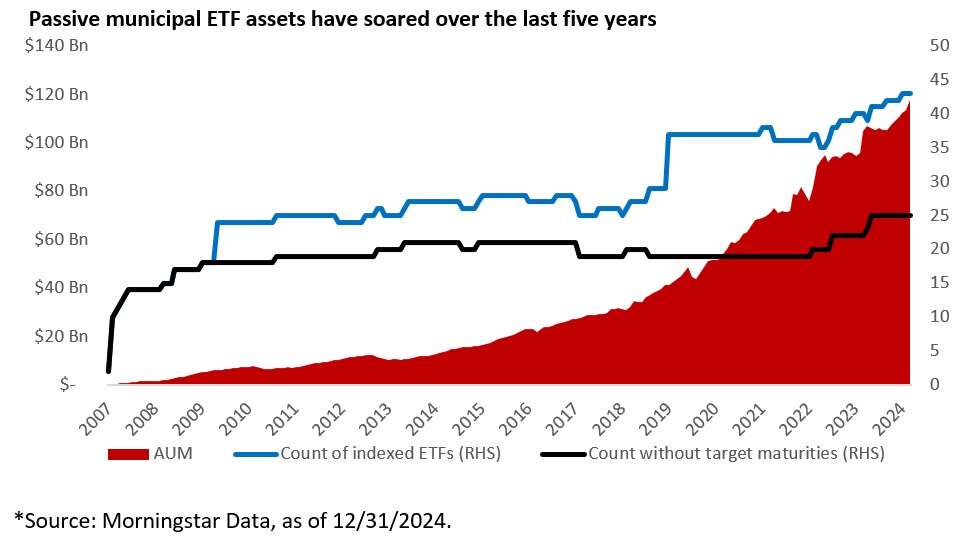Remembering Bogle: A New Standard for Municipal Investing
Improvements in technology, data, systematic trading and risk analytics have led to more successful municipal indexing.


Profit and prosper with the best of Kiplinger's advice on investing, taxes, retirement, personal finance and much more. Delivered daily. Enter your email in the box and click Sign Me Up.
You are now subscribed
Your newsletter sign-up was successful
Want to add more newsletters?

Delivered daily
Kiplinger Today
Profit and prosper with the best of Kiplinger's advice on investing, taxes, retirement, personal finance and much more delivered daily. Smart money moves start here.

Sent five days a week
Kiplinger A Step Ahead
Get practical help to make better financial decisions in your everyday life, from spending to savings on top deals.

Delivered daily
Kiplinger Closing Bell
Get today's biggest financial and investing headlines delivered to your inbox every day the U.S. stock market is open.

Sent twice a week
Kiplinger Adviser Intel
Financial pros across the country share best practices and fresh tactics to preserve and grow your wealth.

Delivered weekly
Kiplinger Tax Tips
Trim your federal and state tax bills with practical tax-planning and tax-cutting strategies.

Sent twice a week
Kiplinger Retirement Tips
Your twice-a-week guide to planning and enjoying a financially secure and richly rewarding retirement

Sent bimonthly.
Kiplinger Adviser Angle
Insights for advisers, wealth managers and other financial professionals.

Sent twice a week
Kiplinger Investing Weekly
Your twice-a-week roundup of promising stocks, funds, companies and industries you should consider, ones you should avoid, and why.

Sent weekly for six weeks
Kiplinger Invest for Retirement
Your step-by-step six-part series on how to invest for retirement, from devising a successful strategy to exactly which investments to choose.
Multiple decades have passed since John “Jack” Bogle revolutionized investing and taught us that index-like returns should be the bare minimum our clients should expect from their portfolios. High-fee products that couldn’t generate long-term outperformance no longer met “the standard.”
Since then, indexing strategies have grown exponentially, particularly within ETFs. If an investor felt their manager was not meeting their expectations of index-or-better returns, there were many substitutes that could.
Municipal bonds, a fragmented asset class, was slower to mature in the passive trend. For a long time, many considered the concept of “municipal indexing” an oxymoron.
From just $107.88 $24.99 for Kiplinger Personal Finance
Become a smarter, better informed investor. Subscribe from just $107.88 $24.99, plus get up to 4 Special Issues

Sign up for Kiplinger’s Free Newsletters
Profit and prosper with the best of expert advice on investing, taxes, retirement, personal finance and more - straight to your e-mail.
Profit and prosper with the best of expert advice - straight to your e-mail.
Because with nearly 1 million bonds in this market, every buy decision within a portfolio presents a large benchmark-relative overweight and therefore benchmark-relative risk.
Even Vanguard offered only active strategies for municipals for decades.
However, recent improvements in technology, data, systematic trading and risk analytics have enabled a more effective set of conditions for municipal indexing to be successful.
Flows have acted accordingly. Assets in passively managed municipal ETFs stand at $118 billion, nearly tripling over the last five years.
Over this time, the number of ETF products hasn’t expanded as rapidly. Instead, the rise in assets is attributable to incumbent products becoming larger, more diversified and more liquid.
Just as it did for other asset classes decades ago, indexing is now setting the “Bogle standard” for municipal investing: Do not settle for less than index-level returns!

Investors now have a variety of at-scale passive municipal strategies at their fingertips across investment-grade state and national exposures.
Regardless of vehicle (mutual funds, ETFs, direct bond purchases and SMAs), high earners should recognize the evolution of this market, with this new standard for municipal investing, and reassess their expectations for investment outcomes.
Our clients should now be asking for more from their municipal investments, unwilling to compromise for anything less than index-or-better returns.
A few last thoughts to round out the picture:
- We use the phrase “index-or-better returns” to capture the idea that active managers are still highly valuable in this fragmented market, but investors should require such managers to outperform over full market cycles net of fees.
- Some managers will deliver excess beta within supposed investment-grade strategies and call it alpha. Be discerning, look at benchmark-relative drawdowns and ensure the strategy is what you think it is.
All investing is subject to risk, including the possible loss of the money you invest.
Although the income from a municipal bond fund is exempt from federal tax, you may owe taxes on any capital gains realized through the fund's trading or through your own redemption of shares. For some investors, a portion of the fund's income may be subject to state and local taxes, as well as to the federal Alternative Minimum Tax.
Related Content
- Five Considerations About Municipal Bonds if Tax Cuts Sunset
- How to Survive Market Mayhem
- Four Ways to Invest in Quantum Computing
Profit and prosper with the best of Kiplinger's advice on investing, taxes, retirement, personal finance and much more. Delivered daily. Enter your email in the box and click Sign Me Up.

Paul Malloy is head of municipal investment at Vanguard. Previously, he was head of Vanguard Fixed Income Group, Europe. In that role, Paul managed portfolios that invested in global fixed income assets. He also oversaw Vanguard’s European Credit Research team. Mr. Malloy joined Vanguard in 2005, the Fixed Income Group in 2007 and has held various portfolio management positions in Vanguard’s offices in the United Kingdom and the United States.
-
 How Much It Costs to Host a Super Bowl Party in 2026
How Much It Costs to Host a Super Bowl Party in 2026Hosting a Super Bowl party in 2026 could cost you. Here's a breakdown of food, drink and entertainment costs — plus ways to save.
-
 3 Reasons to Use a 5-Year CD As You Approach Retirement
3 Reasons to Use a 5-Year CD As You Approach RetirementA five-year CD can help you reach other milestones as you approach retirement.
-
 Your Adult Kids Are Doing Fine. Is It Time To Spend Some of Their Inheritance?
Your Adult Kids Are Doing Fine. Is It Time To Spend Some of Their Inheritance?If your kids are successful, do they need an inheritance? Ask yourself these four questions before passing down another dollar.
-
 The 4 Estate Planning Documents Every High-Net-Worth Family Needs (Not Just a Will)
The 4 Estate Planning Documents Every High-Net-Worth Family Needs (Not Just a Will)The key to successful estate planning for HNW families isn't just drafting these four documents, but ensuring they're current and immediately accessible.
-
 Love and Legacy: What Couples Rarely Talk About (But Should)
Love and Legacy: What Couples Rarely Talk About (But Should)Couples who talk openly about finances, including estate planning, are more likely to head into retirement joyfully. How can you get the conversation going?
-
 How to Get the Fair Value for Your Shares When You Are in the Minority Vote on a Sale of Substantially All Corporate Assets
How to Get the Fair Value for Your Shares When You Are in the Minority Vote on a Sale of Substantially All Corporate AssetsWhen a sale of substantially all corporate assets is approved by majority vote, shareholders on the losing side of the vote should understand their rights.
-
 Dow Leads in Mixed Session on Amgen Earnings: Stock Market Today
Dow Leads in Mixed Session on Amgen Earnings: Stock Market TodayThe rest of Wall Street struggled as Advanced Micro Devices earnings caused a chip-stock sell-off.
-
 How to Add a Pet Trust to Your Estate Plan: Don't Leave Your Best Friend to Chance
How to Add a Pet Trust to Your Estate Plan: Don't Leave Your Best Friend to ChanceAdding a pet trust to your estate plan can ensure your pets are properly looked after when you're no longer able to care for them. This is how to go about it.
-
 Want to Avoid Leaving Chaos in Your Wake? Don't Leave Behind an Outdated Estate Plan
Want to Avoid Leaving Chaos in Your Wake? Don't Leave Behind an Outdated Estate PlanAn outdated or incomplete estate plan could cause confusion for those handling your affairs at a difficult time. This guide highlights what to update and when.
-
 I'm a Financial Adviser: This Is Why I Became an Advocate for Fee-Only Financial Advice
I'm a Financial Adviser: This Is Why I Became an Advocate for Fee-Only Financial AdviceCan financial advisers who earn commissions on product sales give clients the best advice? For one professional, changing track was the clear choice.
-
 Nasdaq Slides 1.4% on Big Tech Questions: Stock Market Today
Nasdaq Slides 1.4% on Big Tech Questions: Stock Market TodayPalantir Technologies proves at least one publicly traded company can spend a lot of money on AI and make a lot of money on AI.